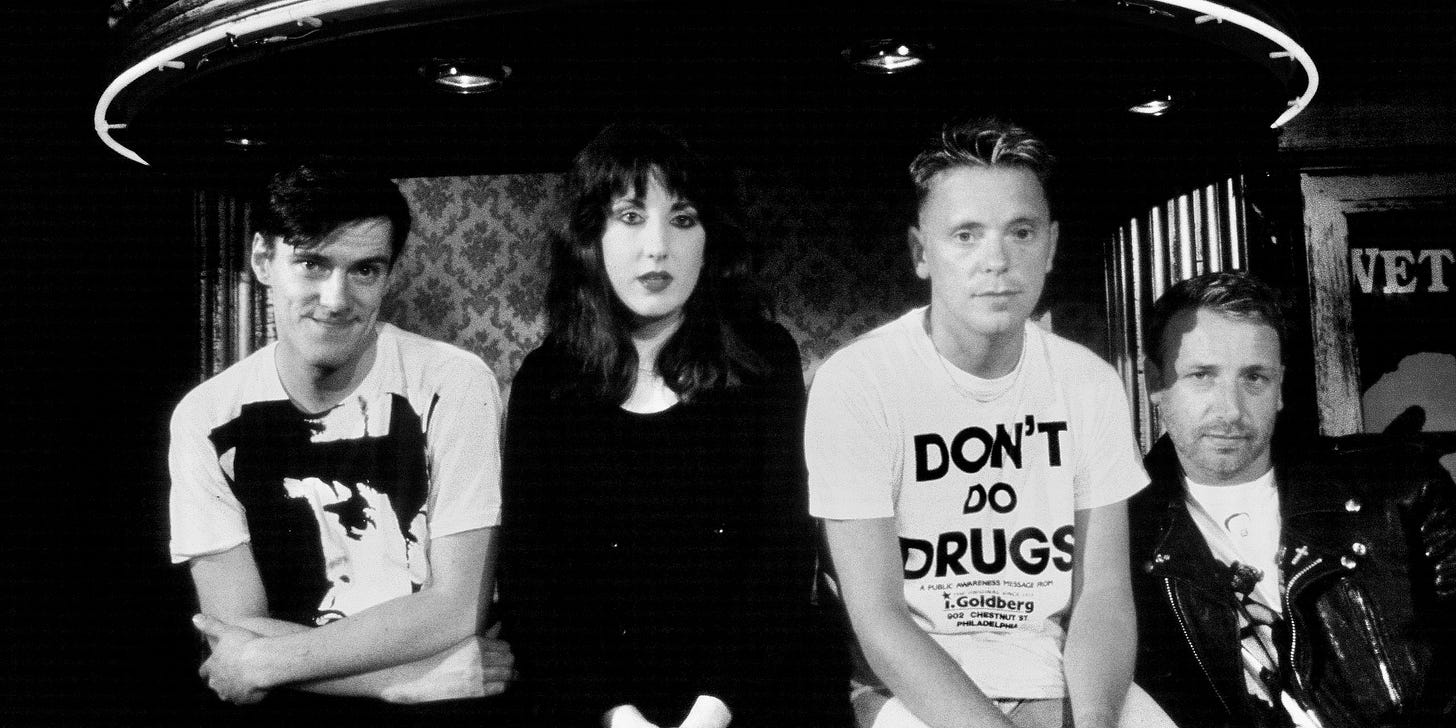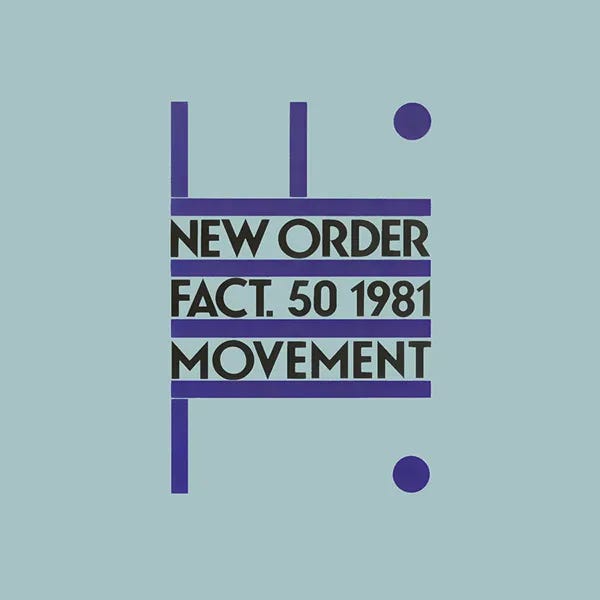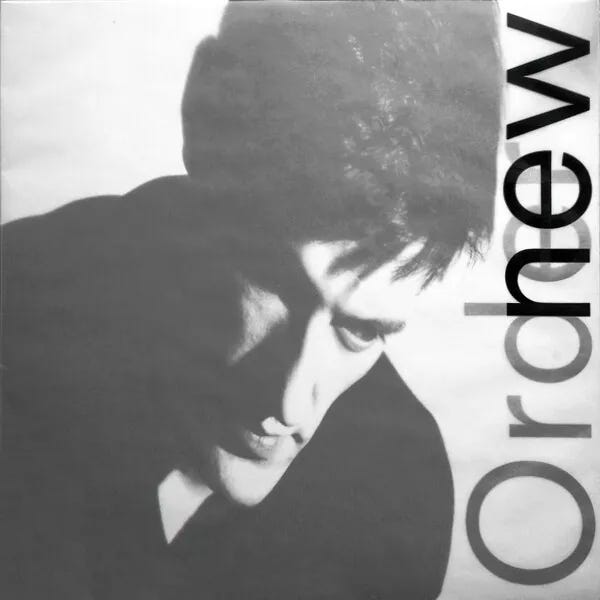What happens when a member of a band quits, moves away, or passes away? Does the rest of the band soldier on without them? Or do they become something different, something new?
That’s the dilemma that Manchester post-punk band Joy Division had to face when singer Ian Curtis hung himself, but thankfully, they already made a contingency plan that should any member quit, the rest would retire the band name. And so, the rest of the band—guitarist Bernard Sumner, bassist Peter Hook, and drummer Stephen Morris—rechristened themselves New Order, and re-expanded into a quartet by adding keyboardist Gillian Gilbert, who had played with Joy Division beforehand as a back-up guitarist.
I like New Order a lot because they were able to gracefully transition from rock to electronic music, which helped me pivot away from my own rock-centric tastes. What made them great was just that: they approached dance music as a rock band, and couldn’t help themselves such that even when they got more synthy and Stephen Morris increasingly used drum machines—both of which they had already increasingly tested out as Joy Division—their grooves always had a rock heft to it. Moreover, Peter Hook’s bass-lines already had a strong sense of melody to its groove, and even as Joy Division, the rest of the band couldn’t help but get pulled into his charge.
The criticism that has clung to New Order like cheap soap ever since they neglected to put the lead singles onto their actual albums is that they were a singles group, and people will point you to start with the 1987 compilation Substance. Substance was forced onto the band by Factory Records’ head Tony Wilson who wanted all of their hits in one place and arranges their singles in chronological order so you can witness them slowly expunge Joy Division’s bleakness onto the dancefloor: the only remnant that this was mostly the same band was their name, a reference to the Nazi vision of a “great European New Order.”
But the problem with calling them a singles group is that they have many, many deep cuts that weren’t released on singles, and their run in the 1980s produced albums that were all, at the bare minimum, good. On the other hand, listening only to their studio albums misses out on a lot of great singles. So what I suggest instead of starting with Substance is to get the 2008 collector’s editions of their 80s’ albums which tack on the non-album singles onto the parent albums. (But of course, they neglect to add everything: the original “True Faith”’s absence on the Brotherhood reissue sticks out like a sore thumb.)
I don’t like Movement. It’s their weakest album of their first five albums, and I’d say it’s only worth keeping around because it’s basically the closest thing we got to a third Joy Division album. “Ceremony” was their lead single as this new group, and it’s also better than anything on the album that it was omitted from, but it’s no surprise why: “Ceremony” was originally a Joy Division song. By contrast, the songs they made for Movement are very much a continuation of where Joy Division left off but without Curtis, and so it often feels like there’s something missing. Take opener “Dreams Never End” for example: the band are clearly trying to rewrite “Ceremony” in how the bouncy guitar line declares itself, the heady drums enter after, but it loses the plot when Peter Hook tries his best to imitate Curtis. Thankfully, Stephen Morris’ drumming and drum programming is extremely inventive throughout, as if he’s trying to create another voice to fill in the void: “Truth” is already inching towards the dance floor, while the drums on “Senses” and “Denial” are so incredibly elastic, it feels like the space between the individual beats have been minimized as much as possible. Released just one year later, “Temptation” is a key single for them as they take the plunge into synth-pop, climaxing half-way by folding post-punk guitars into the new template and proving these two genres could co-exist just before a lovely bridge about different-coloured eyes that feels like starring into the planet-wide irises of the woman you just met at the club.
Like the Smiths’ Meat is Murder without “How Soon is Now?”, Power, Corruption & Lies is a great album without “Blue Monday,” but it would’ve only improved with it. It might be their best song, and the machine gun drum pattern that opens it is a classic. The bass-line of opener “Age of Consent” announces the band’s emergence from the post-punk cold into the warmth of temptation: they even repurpose Joy Division’s “Love Will Tear Us Apart” drums to prove that out. Thus, this is the first New Order album to actually sound like New Order. Sumner is more convincing here than last time since he’s mostly not putting on an Ian Curtis impression, although the way he holds “At the end of the road” in “We All Stand” doesn’t come off because he’s unable to summon the despair of knowing you’re going to meet your death (“Three miles to go / At the end of the road / There’s a soldier waiting for me”), and the high notes on “Leave Me Alone” are unnatural for him. I don’t want to rag too much because his vocals aren’t the focal point of New Order—and his lyrics tend to be absolutely feeble and often quite annoying with any close scrutiny—and the weaker vocals actually result in a few happy accidents: quietly telling a former paramour to piss off on “Your Silent Face” gains more power, while elsewhere, they hide the bad poetry on “Leave Me Alone” (nothing wrong with the word “trod” but it got him in the mood to use “thou” which is harder to pull off). There are a few tracks that feel like songs as much as “Age of Consent”—notably “Your Silent Face” and “Leave Me Alone”—but for the most part, Power, Corruption & Lies feels like the middle ground between textural ambient and dance music that wasn’t really a thing in 1983.
Low-Life was New Order’s first album to include its big singles, which means two things: (1) the deluxe edition of this album is inherently less useful than the deluxe editions of the previous two albums, and (2) this album is great as-is, whereas both of their preceding albums could have been improved by swapping songs around. “Love Vigilantes” is even brighter than “Age of Consent,” announcing itself with a bright little melodica hook and then bringing in a heavily-processed guitar to bounce in happy harmony with Bernard Sumner. This is followed by “The Perfect Kiss” with its shimmery, shimmery slabs of synths and hyper-elastic guitar line. “Sub-Culture” has some dull vocals from Sumner: the tunelessness of its the opening lines is a harbinger of things to come, and the chorus is not one of his stronger melodies, and frankly he sounds off-key both there and on the closer “Face Up,” but the latter makes up for it with its hyperactive synths and active gallop of a rhythm. Best of all are “Sunrise” and “Elegia,” darker tracks that would be completely forgotten about after this album, much to the band’s detriment, ultimately. “Sunrise” is this synth-pop band looking at their post-punk contemporaries and grinning to themselves knowing they could do better: the groove is angular and yet still intense, the golden mean of New Order Marks I and II. Elsewhere, “Elegia” is a surprising instrumental: an organ-led dirge and the only time on this album that’s a reminder of where they came from. (The expanded edition has the 17-minute version of “Elegia” which is a mild curiosity, but ultimately the song only gets louder and softer; New Order wasn’t like Can who could pull off a track that long.)
The headline that the band split their interests in rock and electronic on Brotherhood is overstated: it sounds like more of the same. What people should mention instead is that Bernard Sumner tries harder here than ever before or again. Years before, he might have just sang the “I want you, I need you” hook of “Paradise” normally, but on Brotherhood, he huffs through them in a way that actually makes it feel like a physical need and not a want. And then there's idiosyncratic of the closer, “Every Little Counts,” where he delivers every line in a half-whisper, half-laugh. It’s not just the vocals though; the lyrics seem to carry more weight too. Most obviously, “All Day Long” might be their best deep cut where he tackles child abuse (“This song / Is about a child who now has gone / And other children like him, too / Abused and used by what adults do”) over synths pretending to be strings. But the album is best-remembered for “Bizarre Love Triangle,” one of their best hits, and where Sumners’ vocals have a young man’s sweet innocence to them.
In the gap years following Brotherhood came three singles, the most noteworthy of which was the “True Faith / 1963” double a-side. Both are proof to me of how awful Sumners could be as a lyricist: he’s unable to tap into any shadow as he tackles drug addiction on “True Faith” or domestic abuse on “1963” (“He said I bought it for you because I love you / And I bought it for you because it’s your birthday, too” —> what the actual fuck was he trying to go for here?), but the band elevates the banal lyrics with some of their most melodic material ever: both songs are career highlights. “Touched by the Hand of God” isn’t nearly as good, leaning hard on that undeniable synth hook, and the giant drum smack—“I was touched” BAM! “by the hand of God”—is just begging for something more to arrive after forcing listeners to pay attention. The 1988 version of “Blue Monday” removes the human component, and true to UK charts form where chart placement are totally random, it scored higher than both “True Faith” and the original “Blue Monday.”
Technique eschews the rock parts of Brotherhood, opting instead to drench itself in acid house and rhythms picked up in Ibiza where the album was recorded. “Run” has chords in the chorus that are very much in the model of “Age of Consent” or “Ceremony,” but the guitar is heavily downplayed, serving the singing which is bolstered by surprising vocal harmonies. Peter Hook’s bass on “Love Less” is another classic Hook bass-line, but the guitar line couldn’t have been happier and makes a lot of their previous work seem dour by comparison. The keyboard line that comes after the chorus on “All the Way” is New Order at their most melodically direct, pure purple shimmer in tone. My favourite of the bunch is “Round & Round,” where Hook’s bass has a rubbery synthetic quality to it. Meanwhile, Sumner’s vocals are typical Sumner sweetness, which belie the biting lyrics that deal at once with his failing marriage and his relationship with Factory Records owner Tony Wilson (“You waste your time, like my money / It ain’t so funny, but it’s true”), whom Sumner criticized for using up too much of the label’s money on unsuccessful side projects. Sumner was vindicated: Technique was New Order’s final album released by Factory Records which went under due to the commercial failure of Happy Mondays’ Yes Please! All that being said, I do miss the ‘old New Order,’ which had more of that aforementioned rock blending with the electronics; I miss the occasional pummel of the guitars, and I miss the industrial coldness from Joy Division that sometimes popped up here and there, whereas the majority of Technique feels like it’s in major keys. “Mr. Disco,” which I like because it has a disco rhythm right before the choruses, is backed by that pretty xylophone-esque texture but turns into the more generic dance remixes of their singles leading up to Technique, except here, it’s on the actual album.
Republic sees the colour of late-80s’ acid house replaced by early-90s generically over-processed alternative dance, and I think it’s a bad sign that this album has six engineers, while their early albums all had—you guessed it—only one each. I’m not saying that an album with more hands in the pie is going to necessarily be better or worse, but I wonder what exactly all these people contributed here when the sound is so bloodless. Peter Hook doesn’t provide a single memorable part, probably because he felt forced to put out the album to help save a club that the band partially owned. “World”—the one time where the bass is reminiscent of Technique—has a cheesy anthemic chorus that would make U2 blush; “Ruined in a Day” has a vaguely trip hop-inspired sound that the band don’t even try to make use of. As for “Regret,” it verges too dangerously into Britpop territory, and any New Order fans have a lot to answer for if they think it ranks with the band’s classics when it doesn’t even sound like the band. That’s the album’s first three songs, and the rest of the album is only patchier from there.
I agree with the consensus that Get Ready is their best album after the 1980s, but not like that compliment means anything. The band isn’t the same, not just because they’re older and less nimble, but because they decide to rock out for some reason here for the first time since Movement while still relying heavily on Stephen Morris’ drum programming. What results is a heavily stilted sound, which is a particularly dangerous prospect for an alternative dance band. A few high-profile rock musicians grace the album such as Billy Corgan during his sabbatical from the Smashing Pumpkins on “Turn My Way,” while Primal Scream’s Bobby Gillespie goes full XTRMNTR on “Rock the Shack” which they might have pulled off if it weren't for such a dumb hook. Closer “Run Wild” has that innocent pre-9/11 optimism, promising “Good times around the corner” which they would never end delivering to us.
Waiting for the Sirens’ Call reportedly cost £700,000 to make, which, adjusting for inflation, is more than 1.5 million USD which means they spent a small fortune trying to make this album listenable and it still ended up as their worst studio album! Gillian Gilbert isn’t around anymore, and so the band fill out the sound with more guitars than Get Ready, but the sound is blustery when it should have been groovy. Whereas they had originally transformed fully from a rock band to a synth-pop band, they want to have their cake and eat it too on Waiting for the Sirens’ Call and its pitiful b-side collection Lost Sirens (their worst product), by playing rock music with synthetic instruments, hence the re-make of “Hey Joe” at the very start. (“Hey Joe”—about shooting your woman for ‘messing around with another man’—is ripe for the remaking in the more self-aware age, but “Who’s Joe” ain’t it.) “Krafty” was the lead single, and doesn’t play up the Kraftwerk sound enough to earn its title, and the lyrics “But out there the world is a beautiful place / With mountains, lakes and the human race” is the most groan-worthy of rhymes. Closer “Working Overtime” is an embarrassing attempt at out-cooling the Strokes, and if you care enough, I'd recommend replacing it with “I’ll Stay With You” from Lost Sirens but to be honest, someone should round up all the copies of both albums and set fire to them.
Peter Hook left the band in 2007, and his absence is sorely missed on Music Complete it’s just not New Order without his easily-identifiable and mobile bass-lines competing for lead with Sumner’s vocals and Morris’ drum programming. By contrast, replacement Tom Chapman mostly sticks to the sidelines and so the bass is no longer the driving instrument, which is death for this band.
But the problem here is that all of these songs are just so damn long: Music Complete is only 11 tracks but runs for more than 64 minutes, with only one song clocking in at less than 5. “Singularity” literally ends at the 3:50 mark, the climax collapsing into complete silence, but then the band enters a ‘bridge’ where it’s clear they’re going to build back towards the groove and neither this trick nor its execution warrant the additional 2 minutes. A few positives, sure: Elly Jackson acts the diva in her backing vocals on “Plastic,” offering a glimpse of this band making more straight up house music instead of increasingly generic synth-pop/alternative dance; I like the summery buzz of synth on “Singularity” in contrast to the cold, mechanical drum programming. But this album’s ceiling is ‘better than it has any right to be’ and not necessarily ‘good’ or even ‘great,’ adjectives beyond their grasp. The Killers’ big hit—not sure what I deserved in a past life to be subjected to it every weekend—was basically a New Order imitation, so it’s fitting that Brandon Flowers is here. Meanwhile, Iggy Pop does a spoken word thing but the words are generic when they’re not downright dopey (“Like the atom and the bomb that causes so much pain” elicits a huge sigh), but if he had to purge this out of the system so we could get his collaboration with Oneohtrix Point Never, then I’m happy for it.
Peter Hook applied for to work for Interpol (the band), which was fitting since they did sound like a cross between Joy Division and the Chameleons, when their bassist Carlos Dengler left, and then formed his own band when that didn’t pan out. New Order attempted to reduce his share of royalties from 25% to 1%, and he responded by suing them, so it’s safe to say that we’ll never ever receive another New Order album with him back in the fold. But I also don’t want another: they helped merge UK’s dance/club and alternative rock spheres together, and then promptly stopped innovating at a time when UK’s electronic music was really taking off, i.e. at the time when they would have needed to innovate the most.
Ceremony - B Power, Corruption & Lies - A- Low-Life - B+ Brotherhood - B+ Technique - B+ Republic - C+ Get Ready - B- Waiting for the Sirens' Call - D Lost Sirens - F Music Complete - C+










Never thought of them as singles band but great piece & agree expanded editions are a must! Think I’d give A’s to PC&L, Low-Life, Brotherhood & Technique. Even though huge drop of in recording quality they can still kick it live.
Agree on PC&L being their best album. "Age of Consent" is probably my favorite New Order song, even before "Blue Monday".